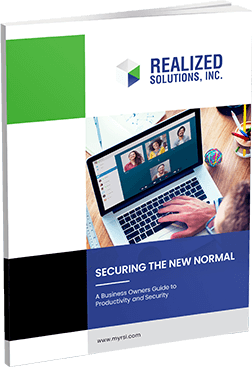Keeping up with customer demand is one thing but staying on top of security compliance that feels like it changes day by day? It’s a tall order, but a necessary one. Your customers trust you to keep their data safe, which means you have a heavy responsibility on your shoulders.
If you’re worried about which IT compliance measures apply to your business, this blog will help. We’ll cover eight common regulations, what they regulate, and if they affect you.
How Do Cybersecurity and IT Compliance Work Together?
To understand how IT compliance affects you, it helps to first look at the relationship between cybersecurity and compliance. Cybersecurity is a set of practices and technologies used to protect data from unauthorized access, modification, or destruction.
Compliance refers to the legal obligation to meet certain IT requirements or regulations set by governments or other governing bodies. It’s like a rectangle and a square—not all cybersecurity tools will be mandated by regulation, but they can still be a vital part of your security toolkit.
But IT compliance measures are designed to increase your data security. Depending on your industry, you may have types of data or different entry points into your system that require more protection. Compliance gives you a specific set of rules you must follow or there are consequences.
8 Regulations That Might Apply to Your Business
Let’s dive into the eight common IT compliance laws so you can determine if they impact you.
NIST: National Institute of Standards and Technology Cybersecurity Framework
NIST is a framework designed to help organizations manage their cybersecurity programs. It covers five essential categories: identify, protect, detect, respond, and recover. The framework gives best practices related to risk management, asset management, access control, identity management, and incident response.
Does NIST apply to you?: If you are a federal agency, contractor, or anyone who does business with the US government, NIST is mandatory.
CMMC: Cybersecurity Maturity Model Certification
CMMC is a set of standards developed by the Department of Defense for all organizations that handle sensitive government data. The framework includes three levels, from basic cybersecurity to advanced, and assumes that more mature networks have better security.
Does CMMC apply to you?: Organizations must achieve a certain level of security before contracting with the US government. Therefore, if you are a defense contractor or vendor, CMMC will likely apply to you.
DFARS: Defense Federal Acquisition Regulation Supplement
DFARS is a set of regulations designed to protect sensitive government information from unauthorized access and malicious attackers. It covers topics such as audit trails, physical security, encryption, system configuration, personnel security, and more.
You might be wondering what the difference between CMMC and DFARS is—while both standards focus on the security of US government data, there are some key differences between them.
CMMC is focused on the overall security posture of an organization, and it requires organizations to meet certain levels of cybersecurity maturity. DFARS, on the other hand, is more specific in its approach – focusing on the use of encryption and system configuration standards.
Does DFAR apply to you?: If you are a contractor that handles data for the US government (including contractors in the defense industry) DFARS will apply to your organization.
PCI DSS: Payment Card Industry Data Security Standard
If you accept payments by credit card (either online or in-person) then you must comply with PCI DSS. This standard includes a set of security requirements for handling cardholder data.
It covers topics such as network security, access control, encryption, and auditing and applies to all organizations that process payments with credit or debit cards.
Does PCI DSS apply to you?: PCI DSS applies to any organization in the payment card industry, including merchants, banks, and payment processors. It’s designed to protect payment cardholder data.
ISO/IEC 27001: Information Security Management Systems
ISO/IEC 27001 is an international standard for information security management systems (ISMS). It provides a framework for evaluating, mitigating, and managing risk. It covers areas such as asset management, risk assessment, access control, and security policies and procedures.
Does ISO/IEC 27001 apply to you?: ISO/IEC 27001 is not legally mandated but following the standard can help demonstrate compliance and due diligence around data security. Many organizations choose to achieve ISO/IEC 27001 certification to build trust with customers and partners.
GDPR: General Data Protection Regulation
GDPR is a set of laws established by the European Union to protect the personal data and privacy of EU citizens. It applies to any organization that collects or processes the personal data of people in the EU, regardless of the company’s location. GDPR covers topics such as data protection by design, data breach notifications, data subject rights, and accountability.
Does GDPR apply to you?: If your organization handles data of people in the EU, then GDPR applies to you. Failure to comply can result in significant fines.
HIPAA: Health Insurance Portability and Accountability Act
HIPAA establishes rules for protecting the privacy and security of protected health information (PHI). It applies to healthcare providers, health plans, and healthcare clearinghouses. HIPAA covers topics such as administrative safeguards, physical safeguards, technical safeguards, and policies/procedures and training.
Does HIPAA apply to you?: Even if you’re not technically in the medical field—for example, if you’re an assisted living facility—but you handle healthcare data, you need to follow HIPAA.
Need Help Keeping Up? Realized Solutions Can Help
Diving deep into IT compliance probably isn’t high on your list of priorities, but ignoring these regulations can lead to serious penalties. Realized Solutions’ team of IT compliance experts can help you understand applicable regulations, develop compliant processes, and stay on top of changes.
Schedule a consultation to learn more about our compliance services and how we can help reduce risk for your organization.




